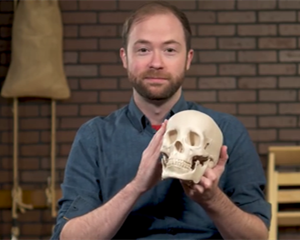Hey there, I'm Mike Rugnetta and this is Crash Course Theater and this is Yorick. More on him later.
嘿大家好,我是迈克·鲁格内塔,这里是戏剧速成课堂,这位是尤里克,稍后我们再详细介绍他。
So maybe you're a part of your school theater program, maybe you're a Broadway musical devotee, maybe you've just been waiting for a series that would explain things like, what are these phalluses doing in Greek drama?
所以,或许你是校剧团的一员,或许你是百老汇的音乐爱好者,或许你只是在等待可以解释一些问题的系列节目,这些问题比如:希腊戏剧里的这些男人们在做什么?
And Who thought neoclassicism was a good idea? And the Theatre of Cruelty, why so mean?
谁曾夸奖过新古典主义?“残酷戏剧”理论(由阿尔托Antonin Artaud倡导)为何如此优秀?
If that's the show that you're after then great, have a seat. We've explored several plays in Crash Course Literature, mostly Greek tragedies and Shakespearean Tragedies, and we'll be looking at plays in Crash Course Theater, but we'll be doing a lot more than that too.
如果这就是你想看的节目,那就太好了,请坐吧。我们已经探讨了速成课程文学里的几部戏剧,主要是希腊悲剧和莎士比亚悲剧,此外我们还会在速成班的剧院里观看戏剧,但我们要做的远不止这些。
We'll explore theater's history, its theories, and even its performance technologies, from the Greeks Right into the modern era. Thunder sheets, fog machines, rotating gobos.
我们还会去研究从希腊一直到现代的戏剧史、戏剧的理论,甚至戏剧的表演技术:雷声效果板、雾烟机、旋转图案。
Because reading a play is great but if you've attended live theater then you know that it's a different and pretty extraordinary experience to see that play performed right In front of you.
因为读一本戏剧感觉很棒,但是如果你看过现场戏剧表演的话,看着戏剧就在你的面前表演,那你肯定就知道,那是一种不同于读戏剧、并且超乎寻常的体验。
We're going to investigate how that experience is produced and what it's meant throughout history to theater going audiences.
我们将会研究那种体验是怎样产生的以及历史上对于去剧院看戏剧的观众们来说它的意义是什么。
Theater going at Least when they aren't running off to go see rope dancers, or consorting with prostitutes, or heading out to grab a beer and a chicken Leg.
去剧院看戏剧总比跑去看演员走钢索、或者和妓女厮混,或者出去买杯啤酒和鸡腿要好得多。
Audiences are tricky but we say it's worth staying in your seat. Why? Because theater is the art form most like life.
观众们很挑剔,但是你待在剧院的座位上是值得的。为什么?因为戏剧是一种来源于生活的艺术。

It's performed by real people, in Real space, in real time, and it's often a way to work out our ideas about the social conflicts and problems of the day. Theater is a laboratory for life.
它是由真人表演的、真实的场景、真实的时间,而且戏剧通常会提供给我们现今生活中出现的社会矛盾和问题的解决办法。剧院就是生活的研究室。
Plays explore how people feel about government, and religion, and birth and death, and love, and each other.
戏剧研究人们对政府、宗教、出生和死亡、爱情、彼此之间的感受。
And sometimes they explore how it's funny to put on a wig and tell lewd jokes. So really just something for everyone.
戏剧有时还会研究戴假发、讲低俗笑话所包涵的趣味性。所以戏剧对每个人都有好处。
And oh, just so you know, I won't be teaching you how to act, or direct, or write plays, or hang lights, or...sew phalluses onto costumes.
并且,哦,如你所知,我不会教你怎么去表演、或者怎么去导演、怎么写剧本、怎么挂灯、或者……怎么把“棒子”缝在服装上。
Not because I don't love making theater, I actually--I've been making theater since I was a kid and before YouTube. I was actually a full-time professional theater artist making multimedia performance art in New York.
不是因为我不喜欢做戏剧,事实上,我一直在做戏剧,在我还小的时候、在YouTube出现之前就在做。其实我之前是一名全职的专业的剧场艺术家,在纽约创作多媒体表演艺术。
And I still do that stuff occasionally don't worry I'll invite you to my one man show.
我偶尔还会做那份工作,不用担心,我会邀请你们去看我的独角戏。
So it's not like we don't find the nuts and bolts of theater exciting, quite the opposite. But here we're mostly concerned with theater's history, technology, and its cultural significance on the whole.
所以不是我们找不到戏剧里令人兴奋的具体细节,而且能找到的太多。但这里我们最关注的是戏剧的历史、技术以及它的整体文化意义。
I'll tell you about Greek tragedy, and Roman comedy, and classical Japanese theater, and how theater returns to the west because of one Nun.
我会向你们讲述希腊悲剧、罗马喜剧,还有日本古典戏剧,以及戏剧是如何因为一个修女而重回西方舞台的。
We'll see cycle plays, and passion plays, and commedia dell'arte, and Shakespeare obviously, but also Renaissance writers other than Shakespeare.
我们会看循环剧、激情剧、还有即兴喜剧、当然还有莎士比亚,还有除了莎士比亚以外其他文艺复兴时期的作家。
We'll cover really long French plays, and shorter Spanish ones, and classical Indian drama, and melodrama, and symbolism, and dadaism, and expressionism and futurism, and all the -isms! Well some of the -isms. A very reasonable number of -isms.
我们会讲很长的法国戏剧、较短的西班牙戏剧、印度古典戏剧,还有音乐剧、象征主义、达达主义和表现主义、还有未来主义,等等所有的主义!嗯,其中一些“主义”。会给大家讲到一个非常合理的“主义”的数量。
And I promise at least one mention of Hamilton. Until then, exit Mike Rugnetta, and I mean could we end a theater show any way other than, curtain!
而且我保证会至少提及一次汉密尔顿。在提及他之前,迈克·鲁格内塔要先退场了,我说,我们能以其它方式给戏剧闭幕吗?除了(拉)幕帘儿!












